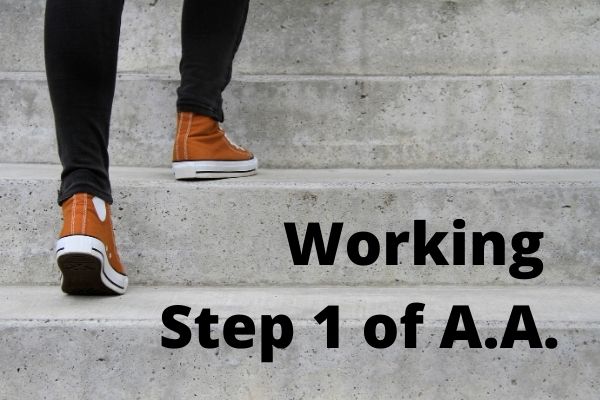“We admit we are powerless over alcohol – that our lives had become unmanageable.”
Breaking Down Step One: How To Complete It Properly
Step 1 of the Alcoholics Anonymous Program may seem straightforward and simple, but it is quite multifaceted. AA participants often mistakenly consider this first step completed by default since they are already aware that they have a problem. However, this approach will cheapen the eye-opening experience that the 12 Steps are intended to provide. If you’re looking to get the most out of your program, working Step 1 correctly will make your recovery journey so much more meaningful.
Deceptively simple, many fail to recognize the gravity of Step 1 and take it to mean “admitting that there is a problem”. While that is inarguably a crucial part of overcoming addiction, it falls short of this step’s true goal. Misconceptions like these are the main obstacle to properly working Step 1 and getting the most out of Alcoholics Anonymous.
Acknowledging the problem is not the same as true admittance of how out of control your addiction is
Many alcoholics in the beginning stages of Alcoholics Anonymous assume they have already completed Step 1 by default because they are actively partaking in a program, have checked into a rehab facility, or have taken initiative to find resources online. While these are fantastic steps towards recovering from alcohol addiction, they do not automatically mean that you have genuinely come to terms with how out of control your drinking has become and how severely it has disrupted your life.
You can be in Alcoholics Anonymous and still be in denial
Your body may be physically present at a meeting or therapy session, but your mind can still hold pockets of resistance. You might unwittingly still blame a friend or family member for drinking in your presence, that if you just stayed away from them you wouldn’t be tempted to drink. Or perhaps you feel that your high-stress job drove you to alcohol and once you find a new one, your drinking habits will return to normal.
Thoughts like these indicate that deep down, you feel that your addiction is the fault of others and that external factors are the true culprit, rather than a lack of your own willpower, discipline, or self-control. Denial is commonplace in addiction recovery; it is a psychological form of self-defense as there can be a lot of shame and stigma tied to addiction. But until you have internalized that you are ultimately the person responsible for the situation you are in, true recovery is impossible. To truly complete Step 1, to admit powerlessness and that you have lost control over your life, requires a deep sense of humility and acceptance of responsibility.
Get Help Working Step 1
Completing step one is a crucial part of the addiction recovery process. However, it can be quite challenging as you must overcome any lingering sense of denial or blame towards others. Coming to terms and facing the reality of your addictions is the most powerful catalyst for positive change – but difficult to do on your own. Find an Alcoholics Anonymous meeting near you today with our helpful and free AA directory.
